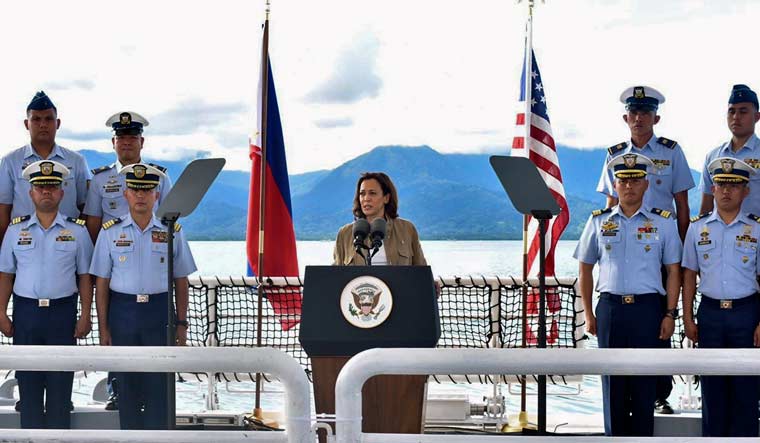Vice President Kamala Harris called on countries Tuesday to stand up for territorial integrity and freedom of navigation in the South China Sea, which has been challenged by China, and said Washington would press an international campaign against irresponsible behaviour in the disputed waters.
Harris did not cite China by name but was obviously referring to Beijing when she underscored America's support to treaty ally the Philippines in the face of intimidation and coercion in the South China Sea.
She spoke aboard a Philippine coast guard patrol ship docked in Puerto Princesa in the western island province of Palawan, which lies at the edge of the disputed waters. The highly symbolic visit was the last leg of a two-day visit that kicked off in Manila on Monday for talks with President Ferdinand Marcos Jr.
Citing the profound stakes for America and the international community in the region, particularly in the busy South China Sea, she called for a broad effort to fight for unimpeded commerce and freedom of navigation and overflight in the disputed waters.
We must stand up for principles such as respect for sovereignty and territorial integrity, unimpeded lawful commerce, the peaceful resolution of disputes, Harris said.
We will continue to rally our allies and partners against unlawful and irresponsible behaviour, she said. When the international rules-based order is threatened somewhere, it is threatened everywhere.
A new confrontation erupted ahead of her visit to Palawan when the Philippine navy alleged a Chinese coast guard vessel had forcibly seized Chinese rocket debris as Filipino sailors were towing it to their island.
Marcos Jr told reporters without elaborating that he was inclined to send a diplomatic protest to China over the incident. He added that he wanted a clarification because China denied there was a forcible seizure of the debris.
The long-seething territorial conflicts involving China, the Philippines, Vietnam, Malaysia, Taiwan and Brunei have long been regarded as an Asian flashpoint and a delicate fault line in the US-China rivalry in the region.
In her talks with Marcos Jr on Monday, Harris reaffirmed Washington's commitment to defend the Philippines under the 1951 Mutual Defence Treaty, which obligates the allies to help defend any side which comes under attack.
An armed attack on the Philippines armed forces, public vessels, or aircraft in the South China Sea would invoke US Mutual Defence commitments, Harris told Marcos Jr. And that is an unwavering commitment that we have to the Philippines.
Marcos Jr thanked Harris, saying that with the upheavals in the region and beyond, this partnership becomes even more important.
In Palawan's main city of Puerto Princesa, Harris visited a small fishing community and discussed with impoverished villagers the impact of illegal fishing on their livelihood.
The US would provide an additional aid of $7.5 million to Philippine maritime law enforcement agencies to boost their capacity to counter illegal fishing, carry out sea surveillance and help in search and rescue efforts, including in the South China Sea, according to a statement issued by her office.
The Philippine coast guard would also get additional US help to upgrade vessel traffic management system for better safety at sea. The Philippines is also now receiving real-time surveillance data to be able to detect and counter illicit activities at sea in a project by the Quadrilateral Security Dialogue, an informal strategic bloc that involves the US, India, Japan and Australia, according to Harris's office.
While the US lays no claims to the strategic waterway, where an estimated $5 trillion in global trade transits each year, it has said that freedom of navigation and overflight is in America's national interest.
In March, US Indo-Pacific commander Adm John C Aquilino told The Associated Press that China has fully militarised at least three of several islands it built in the disputed waters and armed them with anti-ship and anti-aircraft missile systems, laser and jamming equipment in an increasingly aggressive move that threatens all nations operating nearby.
In Sunday's incident in the Spratlys, the most hotly contested area, Vice Adm Alberto Carlos, commander of the Philippine military's Western Command, said a Chinese coast guard ship twice blocked a civilian boat manned by Philippine navy personnel before seizing the debris it was towing off Thitu island.
China denied there was a forcible seizure and said the debris, which it confirmed was from a recent Chinese rocket launch, was handed over by Philippine forces after a friendly consultation.
Chinese coast guard ships have blocked Philippine supply boats delivering supplies to Filipino forces in the disputed waters in the past but seizing objects in the possession of another nation's military would constitute a more brazen act.
China has warned Washington not to meddle in what it calls an Asian dispute and has said that US Navy and Air Force patrols and combat exercises in the disputed waters were militarising the South China Sea.
In July, US Secretary of State Antony Blinken called on China to comply with a 2016 arbitration ruling that invalidated Beijing's vast territorial claims on historical grounds in the South China Sea. China has rejected the decision. (AP) SCY SCY 11221624



